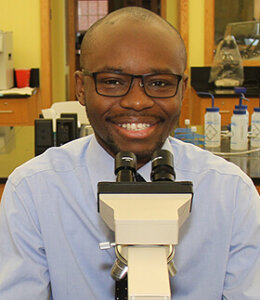Postbaccalaureate premedical studies student Ibrahim Kargbo ’18 is a pretty quiet, laid-back guy. But then he received the email that he’d gotten a summer 2017 internship at the National Institutes of Health (NIH) in Bethesda, Md.
“I was in Chick-fil-A with a classmate, and I just screamed,” he said, smiling. “I never thought I would have a reaction like that to anything.”
 His response was so strong because, months earlier, he had reached out to one of the researchers whose work he admired, asking about internship possibilities. After waiting to hear whether an internship was even a possibility and then going through the “grueling” application process, he heard this spring that he would be working with scientists in the NIH’s National Heart, Lung and Blood Institute (NHLBI).
His response was so strong because, months earlier, he had reached out to one of the researchers whose work he admired, asking about internship possibilities. After waiting to hear whether an internship was even a possibility and then going through the “grueling” application process, he heard this spring that he would be working with scientists in the NIH’s National Heart, Lung and Blood Institute (NHLBI).
“This is a group I wanted to work with,” he said. “Specifically, I’ll be working on sickle cell anemia, which is a genetic blood disease that primarily affects African Americans and other minority populations.”
He had followed the work of this group at NHLBI for a while and specifically contacted them about an internship because of the significance of their research. “The work they’re doing is translational research, where they’re actually trying to find a cure for the disease,” he said.
Ibrahim has friends with sickle cell, and has seen firsthand how debilitating it can be.
“It’s very intense pain,” he said, adding that mothers say sickle-cell pain is worse than labor.
Ibrahim is excited to put what he’s learned in the classroom into practice in the lab.
“I can really see that what we’re learning in class is actually applicable in the real world,” he said. “It puts an even higher level of importance to a lot of the material we’re learning in class, because at the end of the day, if you choose to continue in this field, you’re going to have to apply a lot of these basic concepts we’re learning to try to make the world a better place.”
A native of Sierra Leone, Ibrahim came to the U.S. when he was 5 years old. He attended George Mason University in Fairfax, Va., and graduated in 2010 with a degree in international health and policy.
“I’m the typical ‘first in the family to do X,’ ” Ibrahim said of attending college. His father, a grocery store clerk, wasn’t educated in the U.S. but has put Ibrahim and three of his brothers through college; his youngest brother is in middle school.
Having decided on a career in medicine, either emergency or clinical research, he sought a postbac program to complete the classes he needed to take the Medical College Admission Test (MCAT). He came to Chicopee from a large school — George Mason has more than 34,000 students — and found that he appreciated the small size of Elms and the opportunities it gives students to work closely with faculty and classmates.